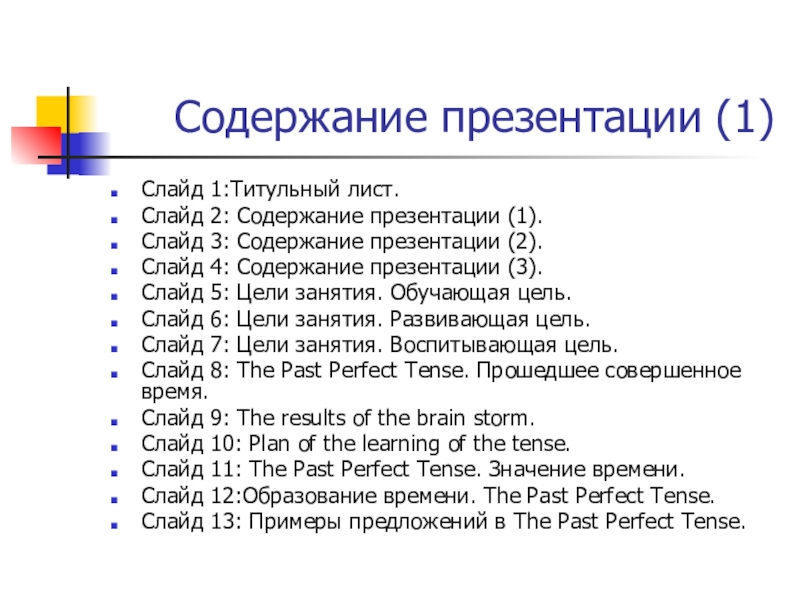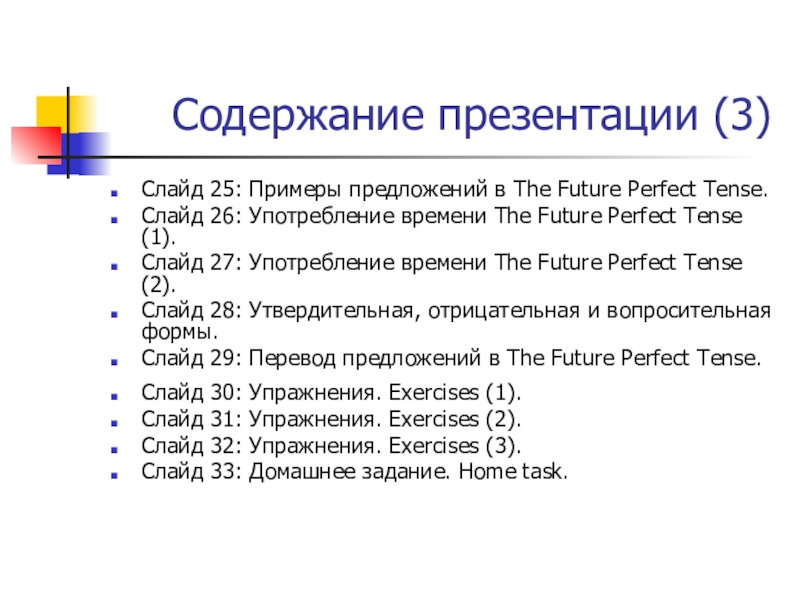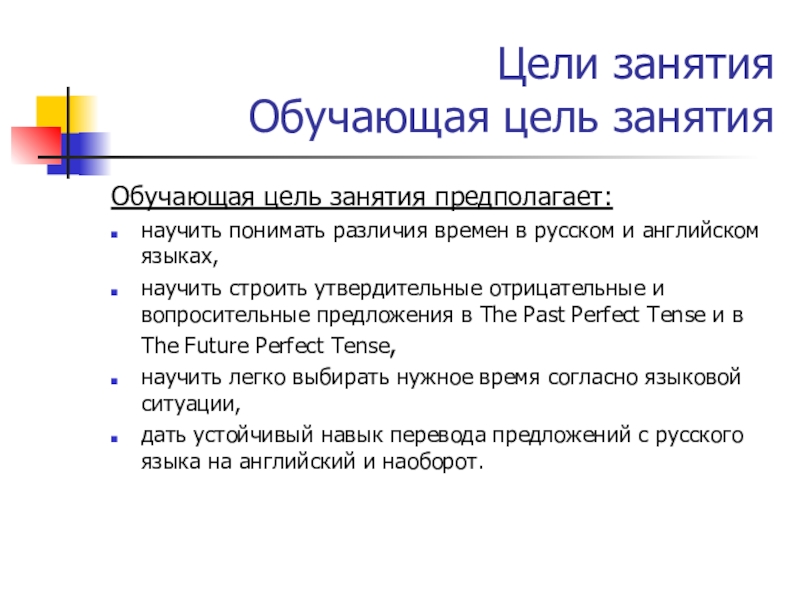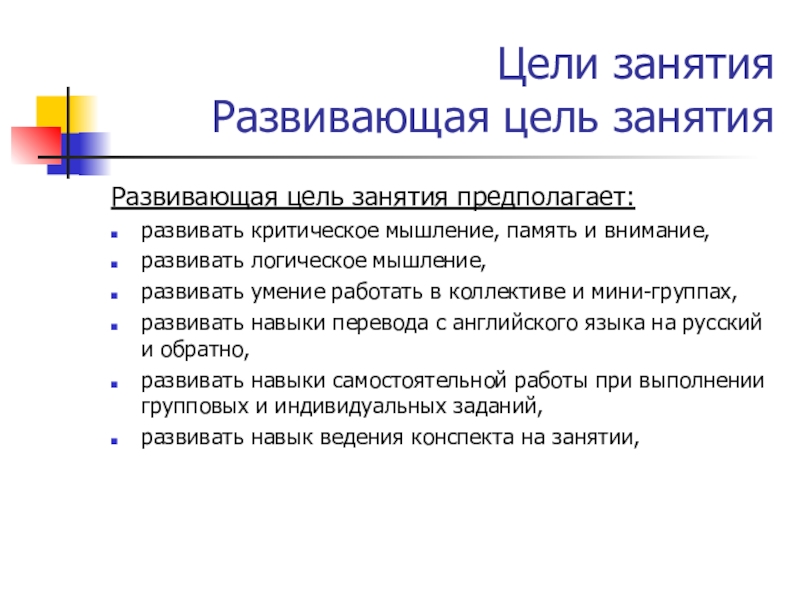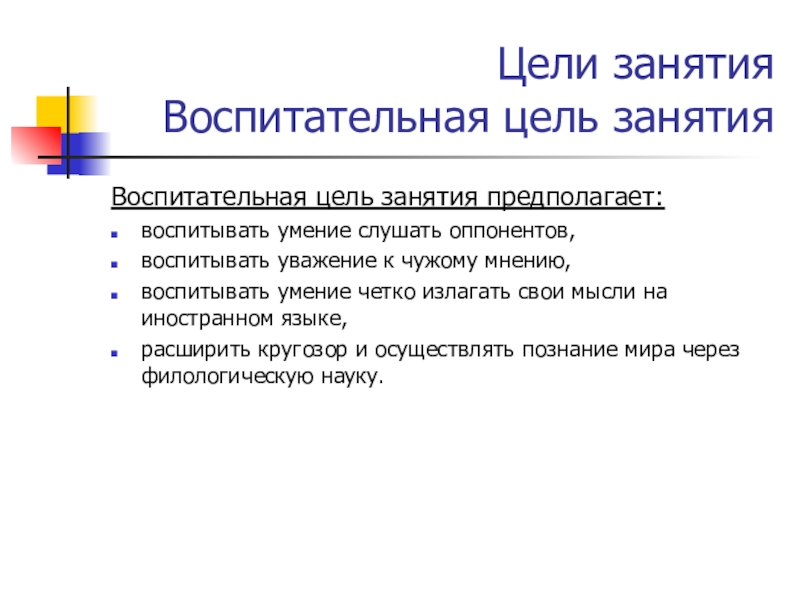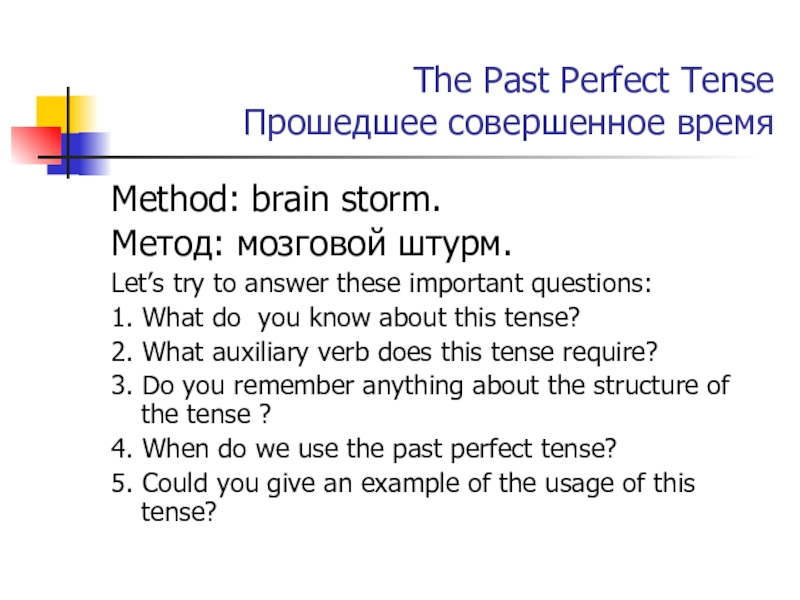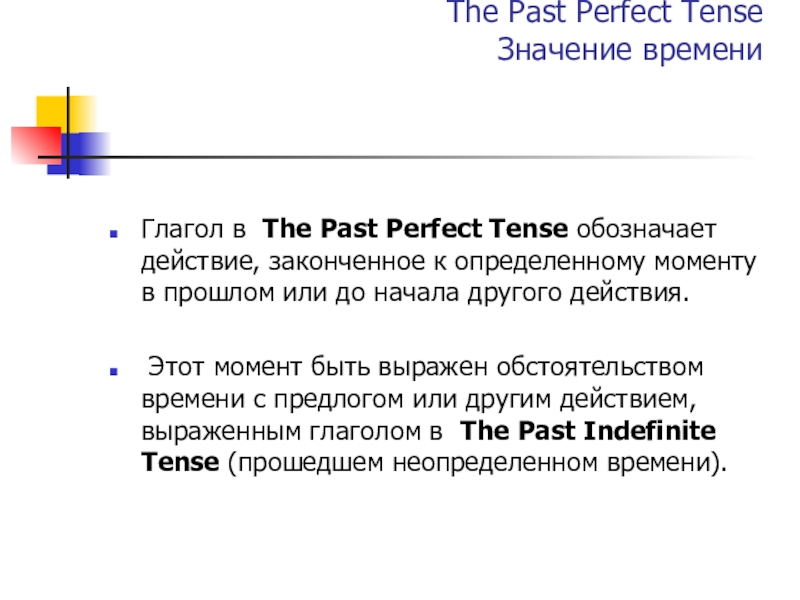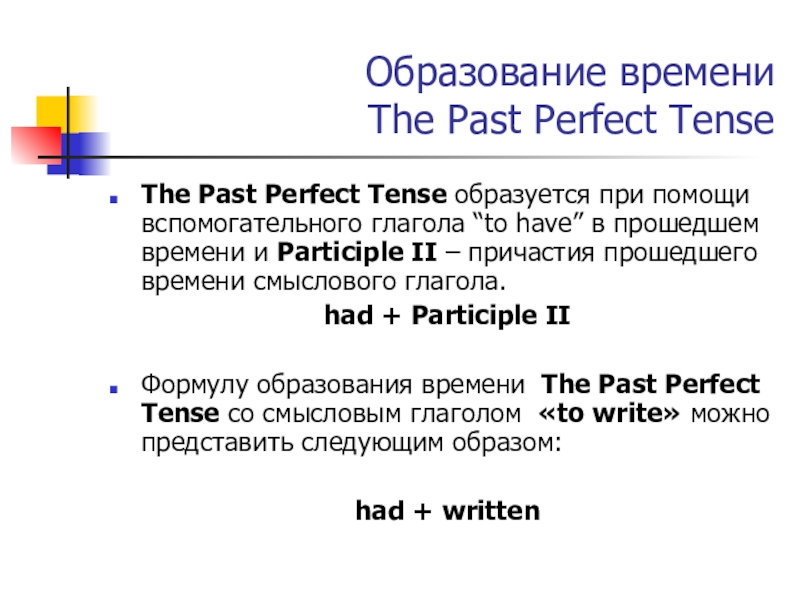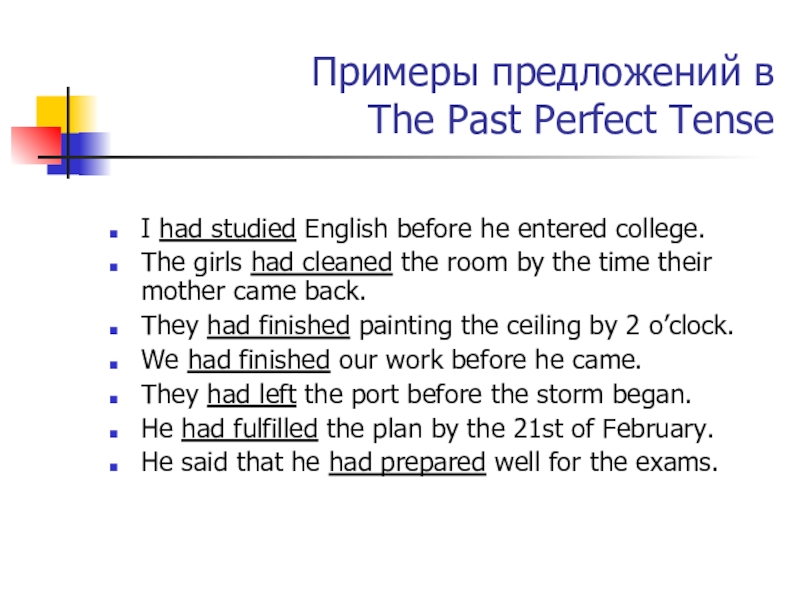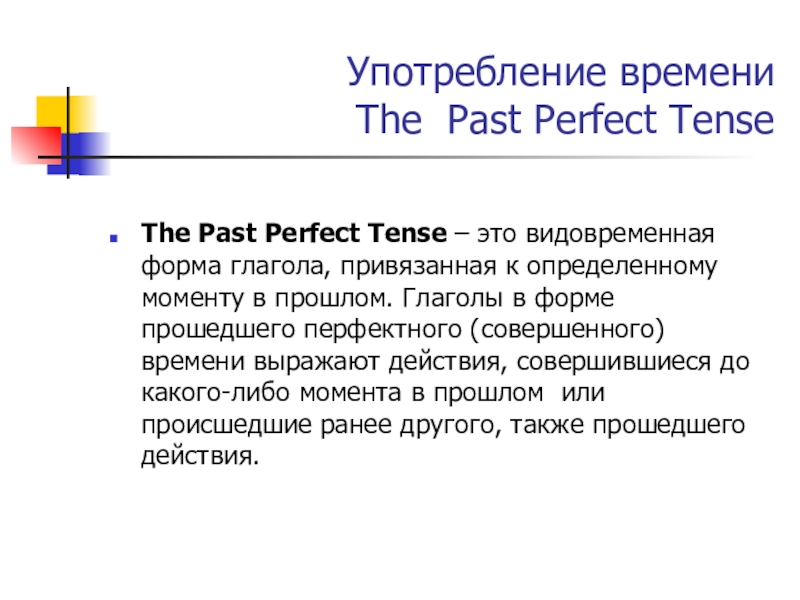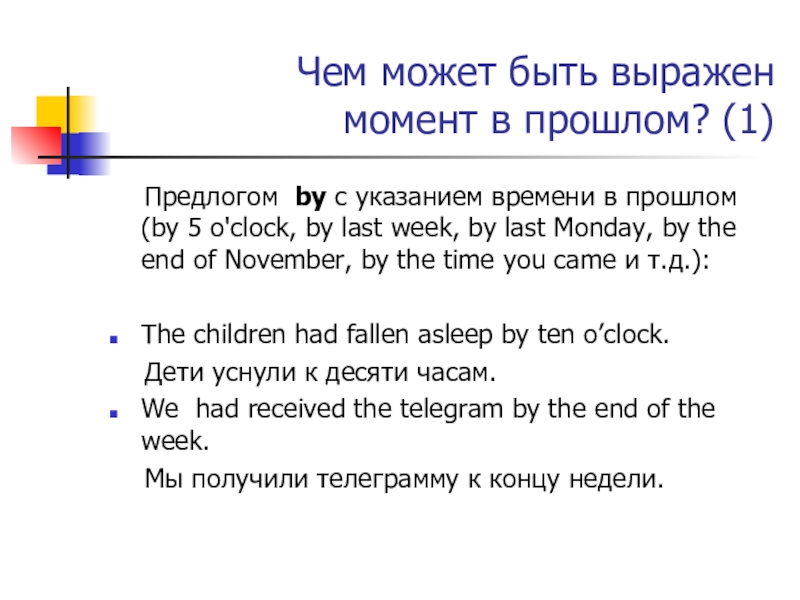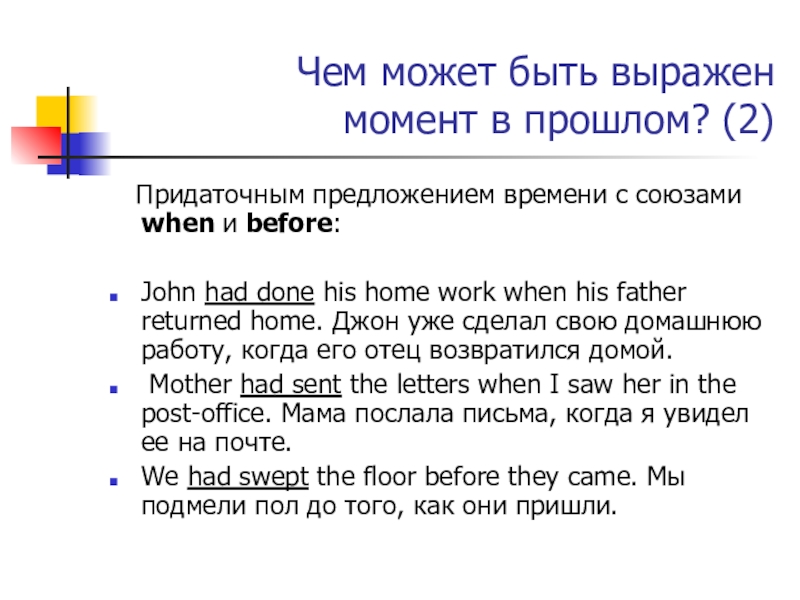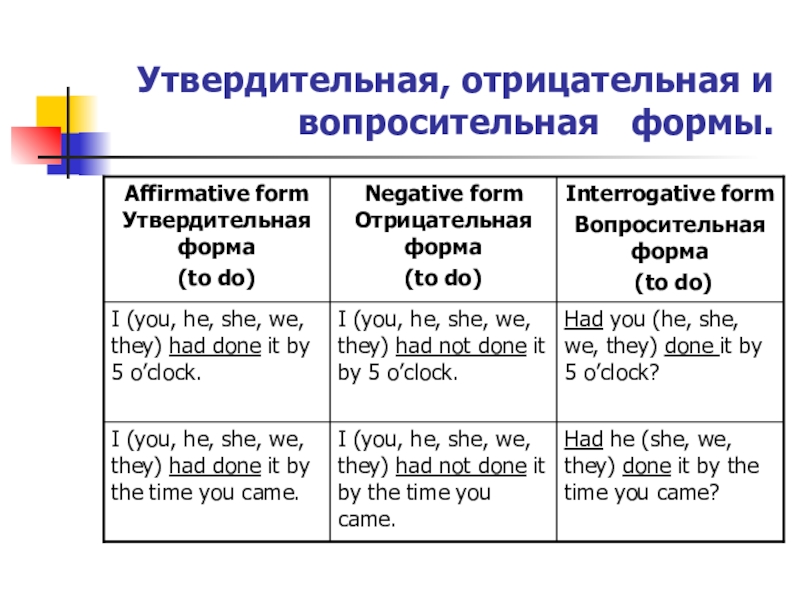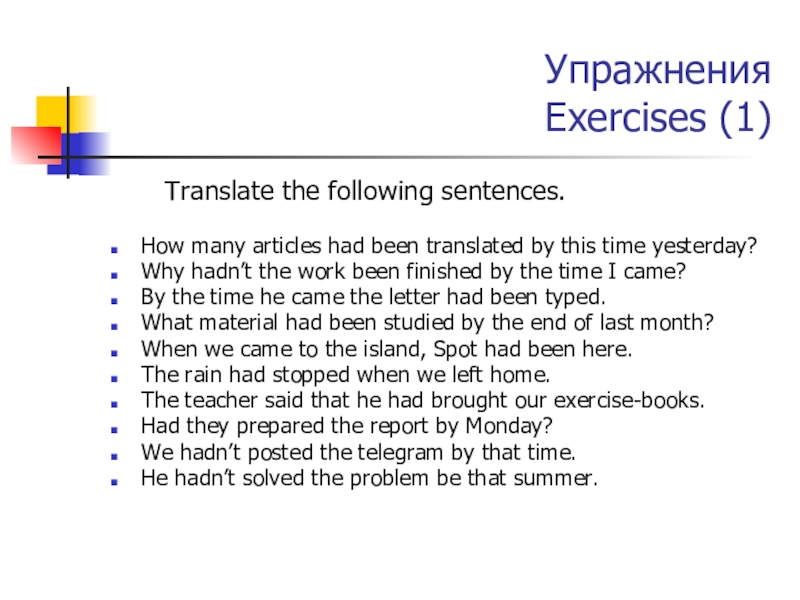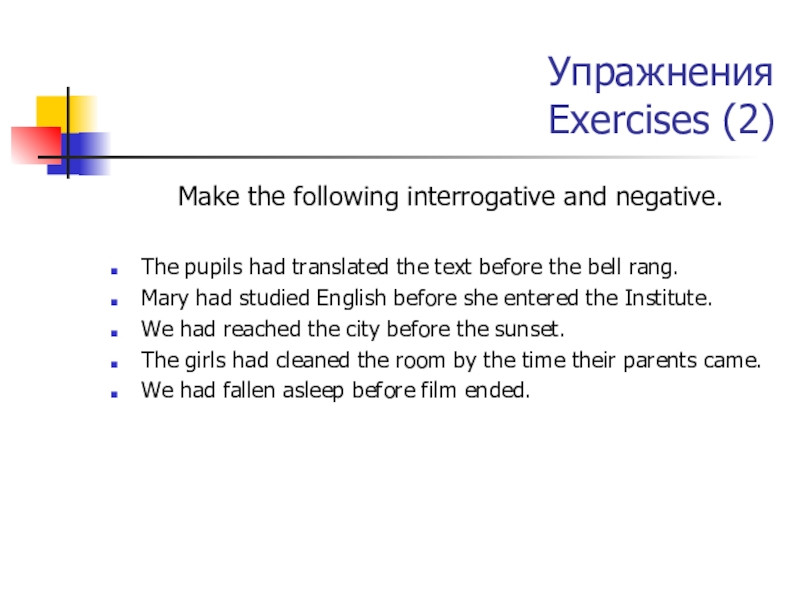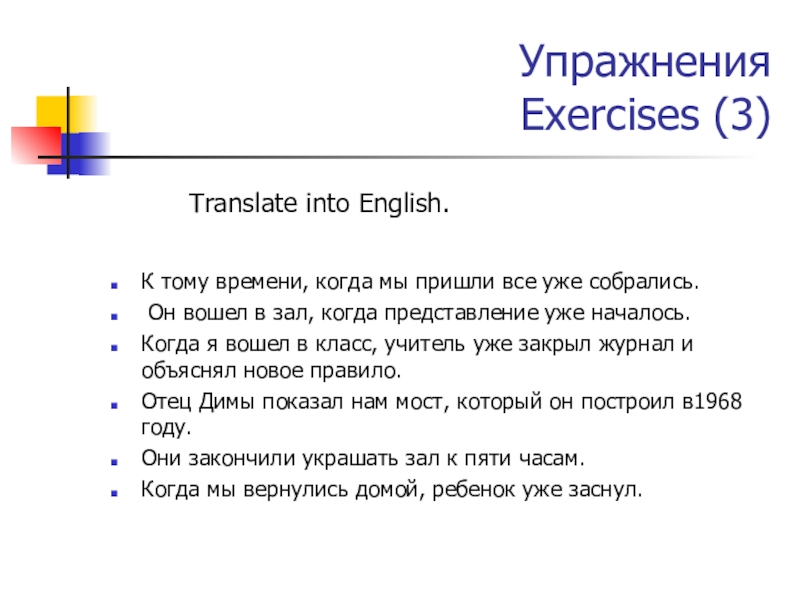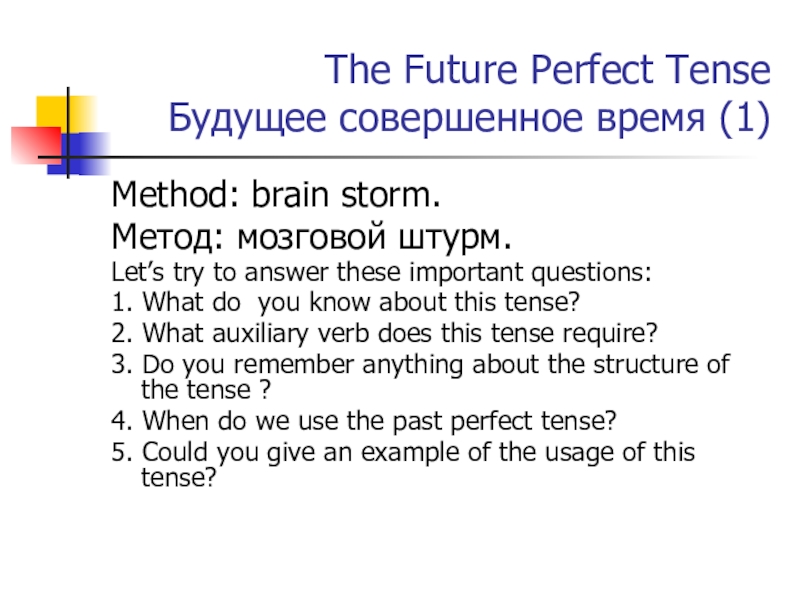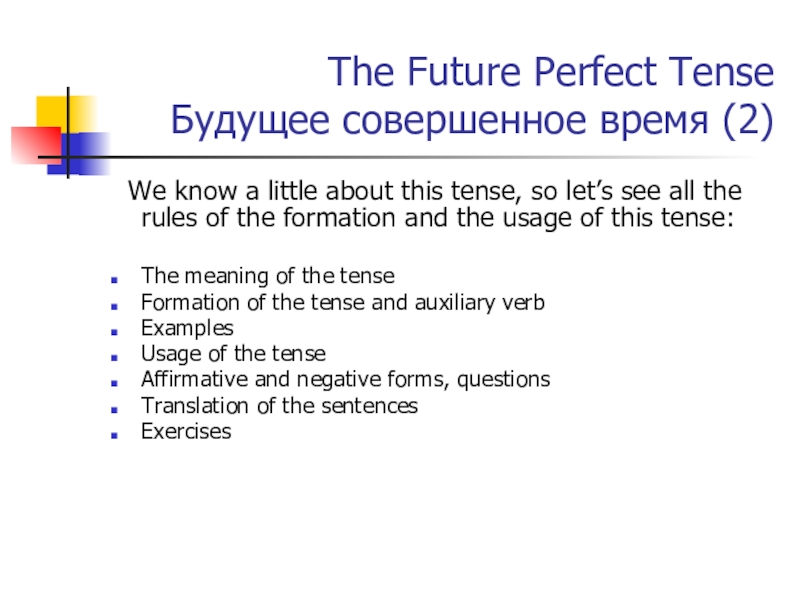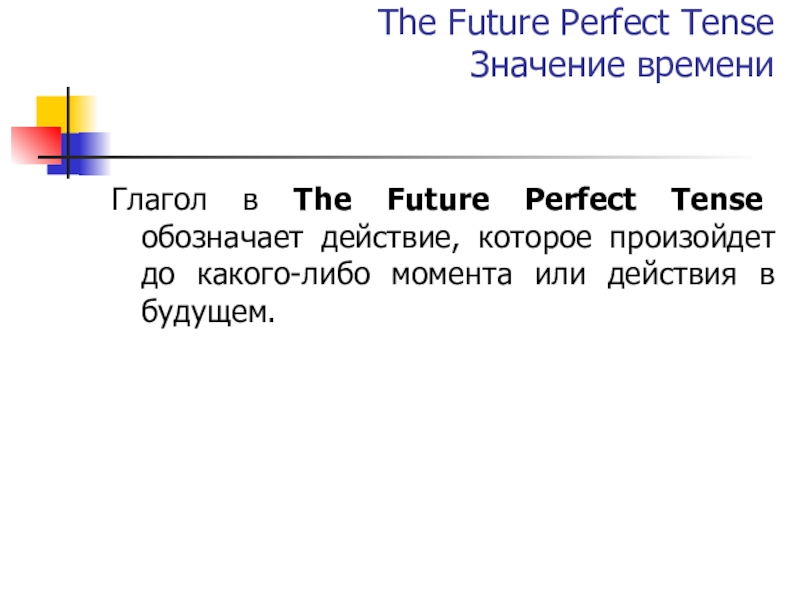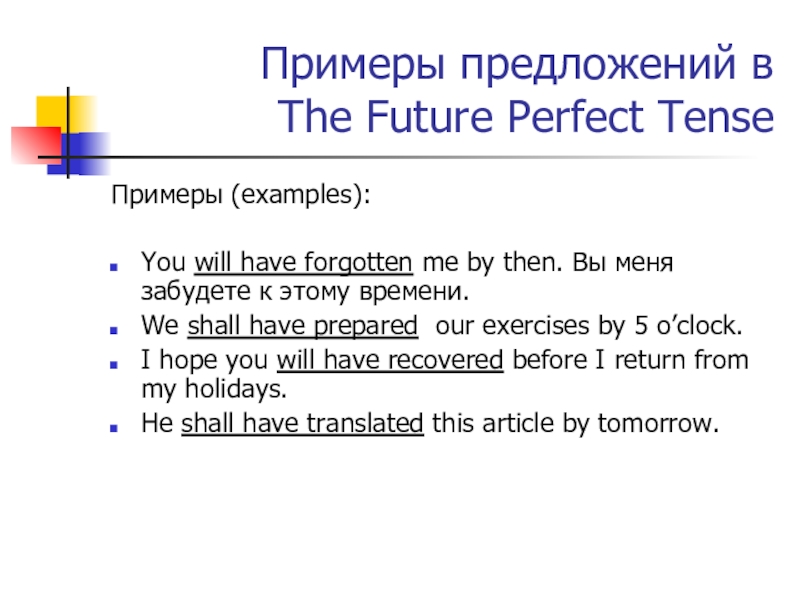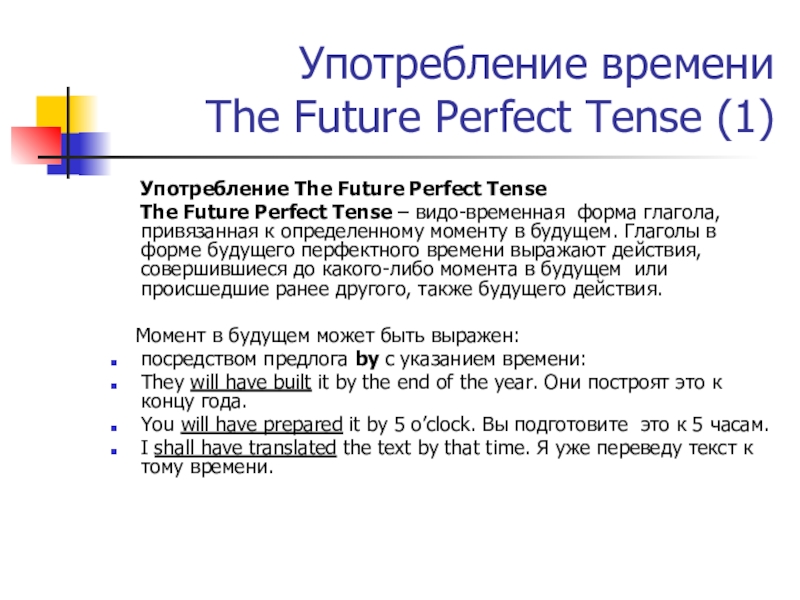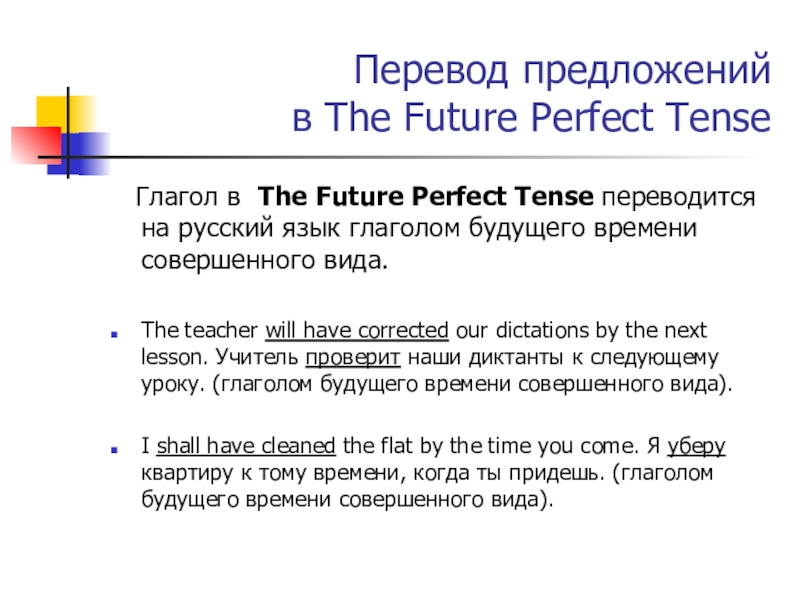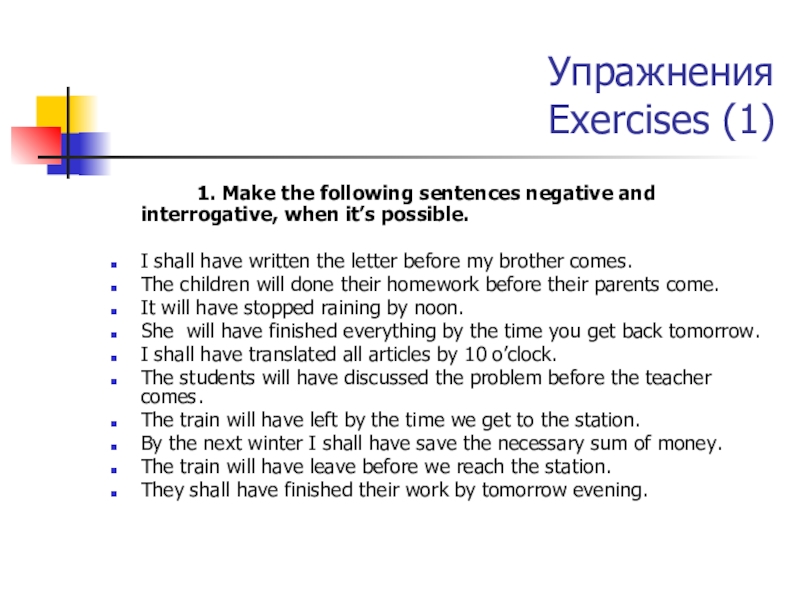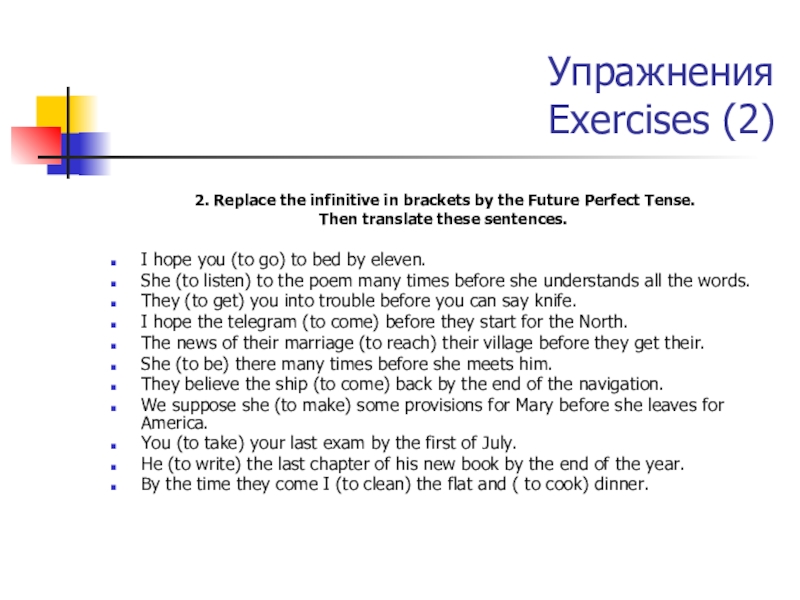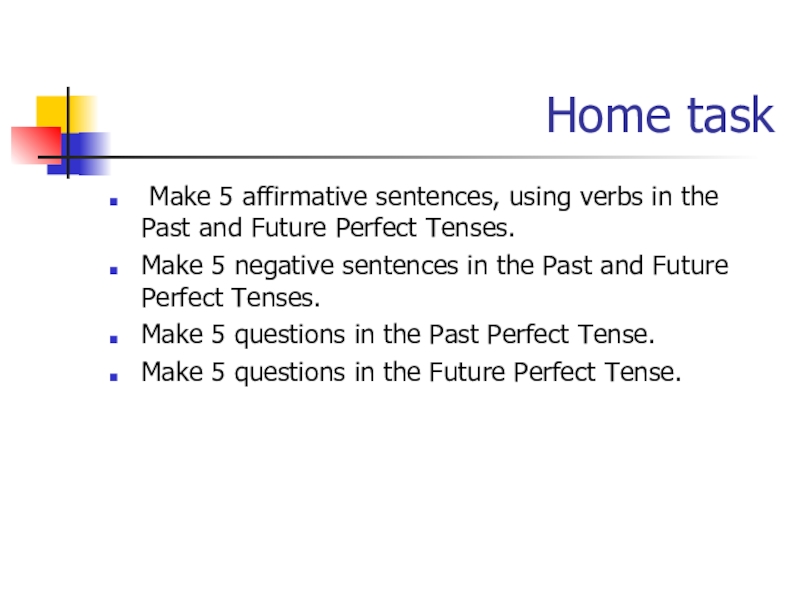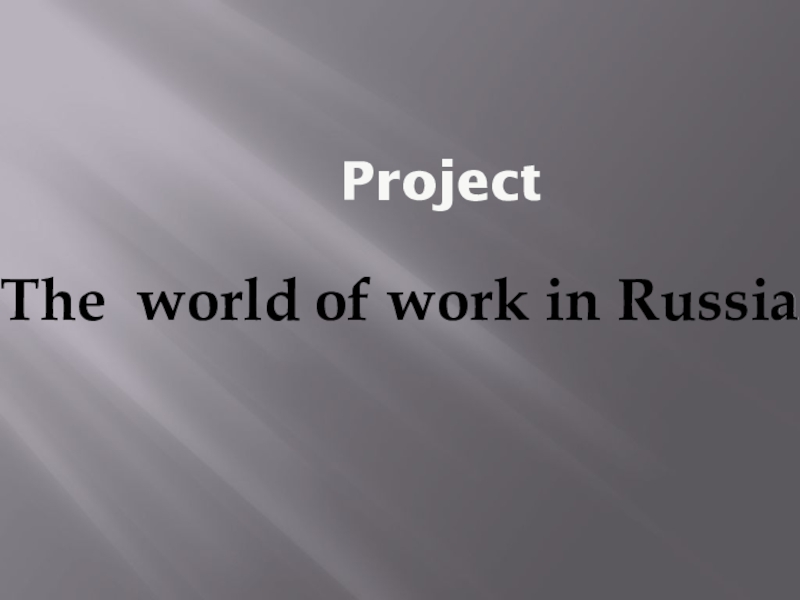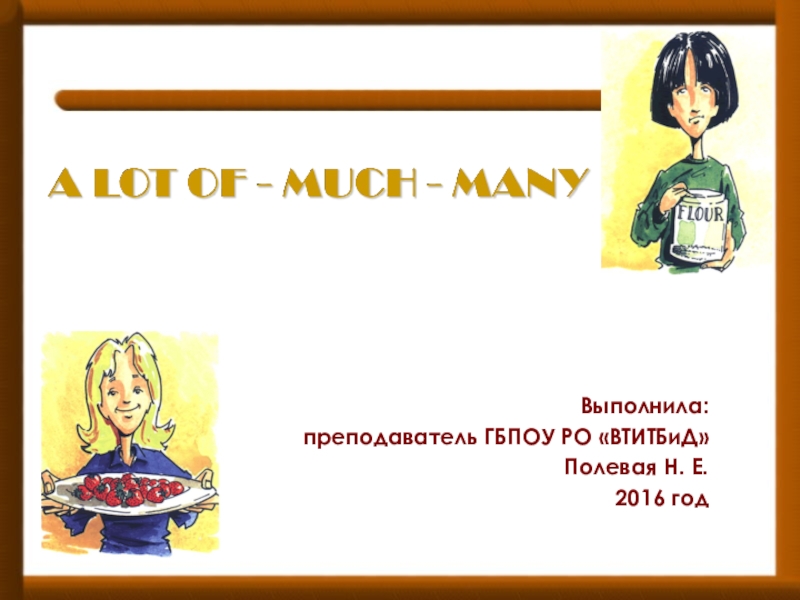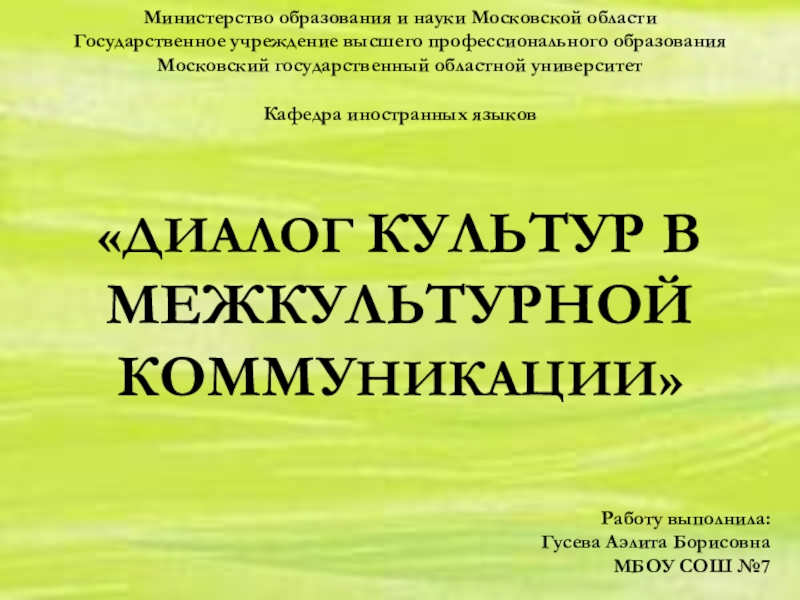Санкт-Петербургское государственное бюджетное профессиональное
образовательное учреждение
«ПОЛИТЕХНИЧЕСКИЙ КОЛЛЕДЖ ГОРОДСКОГО ХОЗЯЙСТВА»
(СПб ГБПОУ «ПКГХ»)
- Главная
- Разное
- Образование
- Спорт
- Естествознание
- Природоведение
- Религиоведение
- Французский язык
- Черчение
- Английский язык
- Астрономия
- Алгебра
- Биология
- География
- Геометрия
- Детские презентации
- Информатика
- История
- Литература
- Математика
- Музыка
- МХК
- Немецкий язык
- ОБЖ
- Обществознание
- Окружающий мир
- Педагогика
- Русский язык
- Технология
- Физика
- Философия
- Химия
- Шаблоны, фоны, картинки для презентаций
- Экология
- Экономика
Презентация, доклад по английскому языку на тему: Past/Future Perfect Tense
Содержание
- 1. Презентация по английскому языку на тему: Past/Future Perfect Tense
- 2. Содержание презентации (1)Слайд 1:Титульный лист.Слайд 2: Содержание
- 3. Содержание презентации (2)Слайд 14: Употребление времени The
- 4. Содержание презентации (3)Слайд 25: Примеры предложений в
- 5. Цели занятия Обучающая цель занятияОбучающая цель занятия
- 6. Цели занятия Развивающая цель занятияРазвивающая цель занятия
- 7. Цели занятия Воспитательная цель занятияВоспитательная цель занятия
- 8. The Past Perfect Tense Прошедшее совершенное
- 9. The results of the brain storm
- 10. Plan of the learning of the tense
- 11. The
- 12. Образование времени The Past Perfect TenseThe Past
- 13. Примеры предложений в The Past Perfect Tense
- 14. Употребление времени The Past Perfect TenseThe
- 15. Чем может быть выражен момент в
- 16. Чем может быть выражен момент в
- 17. Утвердительная, отрицательная и вопросительная формы.
- 18. Упражнения Exercises (1)
- 19. Упражнения Exercises (2)
- 20. Упражнения Exercises (3)
- 21. The Future Perfect Tense Будущее совершенное время
- 22. The Future Perfect Tense Будущее совершенное время
- 23. The Future
- 24. Образование времени The Future Perfect Tense
- 25. Примеры предложений в The Future Perfect TenseПримеры
- 26. Употребление времени The Future Perfect Tense
- 27. Употребление времени The Future Perfect Tense
- 28. Утвердительная, отрицательная и вопросительная формы.
- 29. Перевод предложений в The Future Perfect
- 30. Упражнения Exercises (1)
- 31. Упражнения Exercises (2)
- 32. Упражнения Exercises (3)
- 33. Home task Make 5 affirmative sentences, using
Содержание презентации (1)Слайд 1:Титульный лист.Слайд 2: Содержание презентации (1).Слайд 3: Содержание презентации (2).Слайд 4: Содержание презентации (3).Слайд 5: Цели занятия. Обучающая цель.Слайд 6: Цели занятия. Развивающая цель.Слайд 7: Цели занятия. Воспитывающая цель.Слайд 8: The Past Perfect
Слайд 1The Past/Future Perfect Tense
Прошедшее/Будущее
Совершенное Время
Преподаватель английского языка: Аксенова Ирина Викторовна
Слайд 2Содержание презентации (1)
Слайд 1:Титульный лист.
Слайд 2: Содержание презентации (1).
Слайд 3: Содержание
презентации (2).
Слайд 4: Содержание презентации (3).
Слайд 5: Цели занятия. Обучающая цель.
Слайд 6: Цели занятия. Развивающая цель.
Слайд 7: Цели занятия. Воспитывающая цель.
Слайд 8: The Past Perfect Tense. Прошедшее совершенное время.
Слайд 9: The results of the brain storm.
Слайд 10: Plan of the learning of the tense.
Слайд 11: The Past Perfect Tense. Значение времени.
Слайд 12:Образование времени. The Past Perfect Tense.
Слайд 13: Примеры предложений в The Past Perfect Tense.
Слайд 4: Содержание презентации (3).
Слайд 5: Цели занятия. Обучающая цель.
Слайд 6: Цели занятия. Развивающая цель.
Слайд 7: Цели занятия. Воспитывающая цель.
Слайд 8: The Past Perfect Tense. Прошедшее совершенное время.
Слайд 9: The results of the brain storm.
Слайд 10: Plan of the learning of the tense.
Слайд 11: The Past Perfect Tense. Значение времени.
Слайд 12:Образование времени. The Past Perfect Tense.
Слайд 13: Примеры предложений в The Past Perfect Tense.
Слайд 3Содержание презентации (2)
Слайд 14: Употребление времени The Past Perfect Tense.
Слайд 15:
Чем может быть выражен момент в прошлом?(1)
Слайд 16: Чем может быть выражен момент в прошлом?(2)
Слайд 17: Утвердительная, отрицательная и вопросительная формы.
Слайд 18: Упражнения. Exercises (1).
Слайд 19: Упражнения. Exercises (2).
Слайд 20: Упражнения. Exercises (3).
Слайд 21: The Future Perfect Tense. Будущее совершенное время (1).
Слайд 22: The Future Perfect Tense. Будущее совершенное время (2).
Слайд 23:The Future Perfect Tense. Значение времени. Слайд 24: Образование времени The Future Perfect Tense.
Слайд 16: Чем может быть выражен момент в прошлом?(2)
Слайд 17: Утвердительная, отрицательная и вопросительная формы.
Слайд 18: Упражнения. Exercises (1).
Слайд 19: Упражнения. Exercises (2).
Слайд 20: Упражнения. Exercises (3).
Слайд 21: The Future Perfect Tense. Будущее совершенное время (1).
Слайд 22: The Future Perfect Tense. Будущее совершенное время (2).
Слайд 23:The Future Perfect Tense. Значение времени. Слайд 24: Образование времени The Future Perfect Tense.
Слайд 4Содержание презентации (3)
Слайд 25: Примеры предложений в The Future Perfect Tense.
Слайд
26: Употребление времени The Future Perfect Tense (1).
Слайд 27: Употребление времени The Future Perfect Tense (2).
Слайд 28: Утвердительная, отрицательная и вопросительная формы.
Слайд 29: Перевод предложений в The Future Perfect Tense.
Слайд 30: Упражнения. Exercises (1).
Слайд 31: Упражнения. Exercises (2).
Слайд 32: Упражнения. Exercises (3).
Слайд 33: Домашнее задание. Home task.
Слайд 27: Употребление времени The Future Perfect Tense (2).
Слайд 28: Утвердительная, отрицательная и вопросительная формы.
Слайд 29: Перевод предложений в The Future Perfect Tense.
Слайд 30: Упражнения. Exercises (1).
Слайд 31: Упражнения. Exercises (2).
Слайд 32: Упражнения. Exercises (3).
Слайд 33: Домашнее задание. Home task.
Слайд 5Цели занятия
Обучающая цель занятия
Обучающая цель занятия предполагает:
научить понимать различия времен в
русском и английском языках,
научить строить утвердительные отрицательные и вопросительные предложения в The Past Perfect Tense и в The Future Perfect Tense,
научить легко выбирать нужное время согласно языковой ситуации,
дать устойчивый навык перевода предложений с русского языка на английский и наоборот.
научить строить утвердительные отрицательные и вопросительные предложения в The Past Perfect Tense и в The Future Perfect Tense,
научить легко выбирать нужное время согласно языковой ситуации,
дать устойчивый навык перевода предложений с русского языка на английский и наоборот.
Слайд 6Цели занятия
Развивающая цель занятия
Развивающая цель занятия предполагает:
развивать критическое мышление, память и
внимание,
развивать логическое мышление,
развивать умение работать в коллективе и мини-группах,
развивать навыки перевода с английского языка на русский и обратно,
развивать навыки самостоятельной работы при выполнении групповых и индивидуальных заданий,
развивать навык ведения конспекта на занятии,
развивать логическое мышление,
развивать умение работать в коллективе и мини-группах,
развивать навыки перевода с английского языка на русский и обратно,
развивать навыки самостоятельной работы при выполнении групповых и индивидуальных заданий,
развивать навык ведения конспекта на занятии,
Слайд 7Цели занятия
Воспитательная цель занятия
Воспитательная цель занятия предполагает:
воспитывать умение слушать оппонентов,
воспитывать уважение
к чужому мнению,
воспитывать умение четко излагать свои мысли на иностранном языке,
расширить кругозор и осуществлять познание мира через филологическую науку.
воспитывать умение четко излагать свои мысли на иностранном языке,
расширить кругозор и осуществлять познание мира через филологическую науку.
Слайд 8The Past Perfect Tense
Прошедшее совершенное время
Method: brain storm.
Метод:
мозговой штурм.
Let’s try to answer these important questions:
1. What do you know about this tense?
2. What auxiliary verb does this tense require?
3. Do you remember anything about the structure of the tense ?
4. When do we use the past perfect tense?
5. Could you give an example of the usage of this tense?
Let’s try to answer these important questions:
1. What do you know about this tense?
2. What auxiliary verb does this tense require?
3. Do you remember anything about the structure of the tense ?
4. When do we use the past perfect tense?
5. Could you give an example of the usage of this tense?
Слайд 9The results of the brain storm
We know some information
about this tense:
We know the auxiliary verb of the tense.
We know the structure of the tense.
We know some facts about the usage of the tense.
Now, let’s see the precise information about the Past Perfect Tense and make exercises.
We know the auxiliary verb of the tense.
We know the structure of the tense.
We know some facts about the usage of the tense.
Now, let’s see the precise information about the Past Perfect Tense and make exercises.
Слайд 10Plan of the learning of the tense
The meaning of the
tense
Formation of the tense and auxiliary verb
Examples
Usage of the tense
Affirmative and negative forms, questions
Exercises
Formation of the tense and auxiliary verb
Examples
Usage of the tense
Affirmative and negative forms, questions
Exercises
Слайд 11
The Past Perfect Tense
Значение времени
Глагол в The Past Perfect Tense
обозначает действие, законченное к определенному моменту в прошлом или до начала другого действия.
Этот момент быть выражен обстоятельством времени с предлогом или другим действием, выраженным глаголом в The Past Indefinite Tense (прошедшем неопределенном времени).
Этот момент быть выражен обстоятельством времени с предлогом или другим действием, выраженным глаголом в The Past Indefinite Tense (прошедшем неопределенном времени).
Слайд 12Образование времени
The Past Perfect Tense
The Past Perfect Tense образуется при помощи
вспомогательного глагола “to have” в прошедшем времени и Participle II – причастия прошедшего времени смыслового глагола.
had + Participle II
Формулу образования времени The Past Perfect Tense со смысловым глаголом «to write» можно представить следующим образом:
had + written
had + Participle II
Формулу образования времени The Past Perfect Tense со смысловым глаголом «to write» можно представить следующим образом:
had + written
Слайд 13Примеры предложений в
The Past Perfect Tense
I had studied English before
he entered college.
The girls had cleaned the room by the time their mother came back.
They had finished painting the ceiling by 2 o’clock.
We had finished our work before he came.
They had left the port before the storm began.
He had fulfilled the plan by the 21st of February.
He said that he had prepared well for the exams.
The girls had cleaned the room by the time their mother came back.
They had finished painting the ceiling by 2 o’clock.
We had finished our work before he came.
They had left the port before the storm began.
He had fulfilled the plan by the 21st of February.
He said that he had prepared well for the exams.
Слайд 14Употребление времени
The Past Perfect Tense
The Past Perfect Tense – это
видовременная форма глагола, привязанная к определенному моменту в прошлом. Глаголы в форме прошедшего перфектного (совершенного) времени выражают действия, совершившиеся до какого-либо момента в прошлом или происшедшие ранее другого, также прошедшего действия.
Слайд 15Чем может быть выражен
момент в прошлом? (1)
Предлогом by
с указанием времени в прошлом (by 5 o'clock, by last week, by last Monday, by the end of November, by the time you came и т.д.):
The children had fallen asleep by ten o’clock.
Дети уснули к десяти часам.
We had received the telegram by the end of the week.
Мы получили телеграмму к концу недели.
The children had fallen asleep by ten o’clock.
Дети уснули к десяти часам.
We had received the telegram by the end of the week.
Мы получили телеграмму к концу недели.
Слайд 16Чем может быть выражен
момент в прошлом? (2)
Придаточным предложением
времени с союзами when и before:
John had done his home work when his father returned home. Джон уже сделал свою домашнюю работу, когда его отец возвратился домой.
Mother had sent the letters when I saw her in the post-office. Мама послала письма, когда я увидел ее на почте.
We had swept the floor before they came. Мы подмели пол до того, как они пришли.
John had done his home work when his father returned home. Джон уже сделал свою домашнюю работу, когда его отец возвратился домой.
Mother had sent the letters when I saw her in the post-office. Мама послала письма, когда я увидел ее на почте.
We had swept the floor before they came. Мы подмели пол до того, как они пришли.
Слайд 18Упражнения
Exercises (1)
Translate the following sentences.
How many
articles had been translated by this time yesterday?
Why hadn’t the work been finished by the time I came?
By the time he came the letter had been typed.
What material had been studied by the end of last month?
When we came to the island, Spot had been here.
The rain had stopped when we left home.
The teacher said that he had brought our exercise-books.
Had they prepared the report by Monday?
We hadn’t posted the telegram by that time.
He hadn’t solved the problem be that summer.
Why hadn’t the work been finished by the time I came?
By the time he came the letter had been typed.
What material had been studied by the end of last month?
When we came to the island, Spot had been here.
The rain had stopped when we left home.
The teacher said that he had brought our exercise-books.
Had they prepared the report by Monday?
We hadn’t posted the telegram by that time.
He hadn’t solved the problem be that summer.
Слайд 19Упражнения
Exercises (2)
Make the following interrogative and
negative.
The pupils had translated the text before the bell rang.
Mary had studied English before she entered the Institute.
We had reached the city before the sunset.
The girls had cleaned the room by the time their parents came.
We had fallen asleep before film ended.
The pupils had translated the text before the bell rang.
Mary had studied English before she entered the Institute.
We had reached the city before the sunset.
The girls had cleaned the room by the time their parents came.
We had fallen asleep before film ended.
Слайд 20Упражнения
Exercises (3)
Translate into English.
К тому времени,
когда мы пришли все уже собрались.
Он вошел в зал, когда представление уже началось.
Когда я вошел в класс, учитель уже закрыл журнал и объяснял новое правило.
Отец Димы показал нам мост, который он построил в1968 году.
Они закончили украшать зал к пяти часам.
Когда мы вернулись домой, ребенок уже заснyл.
Он вошел в зал, когда представление уже началось.
Когда я вошел в класс, учитель уже закрыл журнал и объяснял новое правило.
Отец Димы показал нам мост, который он построил в1968 году.
Они закончили украшать зал к пяти часам.
Когда мы вернулись домой, ребенок уже заснyл.
Слайд 21The Future Perfect Tense
Будущее совершенное время (1)
Method: brain storm.
Метод: мозговой
штурм.
Let’s try to answer these important questions:
1. What do you know about this tense?
2. What auxiliary verb does this tense require?
3. Do you remember anything about the structure of the tense ?
4. When do we use the past perfect tense?
5. Could you give an example of the usage of this tense?
Let’s try to answer these important questions:
1. What do you know about this tense?
2. What auxiliary verb does this tense require?
3. Do you remember anything about the structure of the tense ?
4. When do we use the past perfect tense?
5. Could you give an example of the usage of this tense?
Слайд 22The Future Perfect Tense
Будущее совершенное время (2)
We know
a little about this tense, so let’s see all the rules of the formation and the usage of this tense:
The meaning of the tense
Formation of the tense and auxiliary verb
Examples
Usage of the tense
Affirmative and negative forms, questions
Translation of the sentences
Exercises
The meaning of the tense
Formation of the tense and auxiliary verb
Examples
Usage of the tense
Affirmative and negative forms, questions
Translation of the sentences
Exercises
Слайд 23
The Future Perfect Tense
Значение времени
Глагол в The Future Perfect Tense
обозначает действие, которое произойдет до какого-либо момента или действия в будущем.
Слайд 24Образование времени
The Future Perfect Tense
The Future Perfect Tense
образуется при помощи вспомогательного глагола “to have” в прошедшем времени и Participle II – причастия прошедшего времени смыслового глагола.
shall/ will have + Participle II
Формулу образования времени The Future Perfect Tense со смысловым глаголом «to write» можно представить следующим образом:
shall/will have + written
shall/ will have + Participle II
Формулу образования времени The Future Perfect Tense со смысловым глаголом «to write» можно представить следующим образом:
shall/will have + written
Слайд 25Примеры предложений в
The Future Perfect Tense
Примеры (examples):
You will have forgotten me
by then. Вы меня забудете к этому времени.
We shall have prepared our exercises by 5 o’clock.
I hope you will have recovered before I return from my holidays.
He shall have translated this article by tomorrow.
We shall have prepared our exercises by 5 o’clock.
I hope you will have recovered before I return from my holidays.
He shall have translated this article by tomorrow.
Слайд 26Употребление времени
The Future Perfect Tense (1)
Употребление The
Future Perfect Tense
The Future Perfect Tense – видо-временная форма глагола, привязанная к определенному моменту в будущем. Глаголы в форме будущего перфектного времени выражают действия, совершившиеся до какого-либо момента в будущем или происшедшие ранее другого, также будущего действия.
Момент в будущем может быть выражен:
посредством предлога by с указанием времени:
They will have built it by the end of the year. Они построят это к концу года.
You will have prepared it by 5 o’clock. Вы подготовите это к 5 часам.
I shall have translated the text by that time. Я уже переведу текст к тому времени.
The Future Perfect Tense – видо-временная форма глагола, привязанная к определенному моменту в будущем. Глаголы в форме будущего перфектного времени выражают действия, совершившиеся до какого-либо момента в будущем или происшедшие ранее другого, также будущего действия.
Момент в будущем может быть выражен:
посредством предлога by с указанием времени:
They will have built it by the end of the year. Они построят это к концу года.
You will have prepared it by 5 o’clock. Вы подготовите это к 5 часам.
I shall have translated the text by that time. Я уже переведу текст к тому времени.
Слайд 27Употребление времени
The Future Perfect Tense (2)
придаточным предложением:
He shall
have done it before she comes back from the theatre. Он сделает это прежде, чем она вернется из театра.
The film will already have started when we get there. Фильм уже начнется,когла ы доберемся туда.
We shall have finished our work by the time the bell rings. Мы закончим свою работу к тому времени, когда прозвенит звонок.
The film will already have started when we get there. Фильм уже начнется,когла ы доберемся туда.
We shall have finished our work by the time the bell rings. Мы закончим свою работу к тому времени, когда прозвенит звонок.
Слайд 29Перевод предложений
в The Future Perfect Tense
Глагол в The
Future Perfect Tense переводится на русский язык глаголом будущего времени совершенного вида.
The teacher will have corrected our dictations by the next lesson. Учитель проверит наши диктанты к следующему уроку. (глаголом будущего времени совершенного вида).
I shall have cleaned the flat by the time you come. Я уберу квартиру к тому времени, когда ты придешь. (глаголом будущего времени совершенного вида).
The teacher will have corrected our dictations by the next lesson. Учитель проверит наши диктанты к следующему уроку. (глаголом будущего времени совершенного вида).
I shall have cleaned the flat by the time you come. Я уберу квартиру к тому времени, когда ты придешь. (глаголом будущего времени совершенного вида).
Слайд 30Упражнения
Exercises (1)
1. Make
the following sentences negative and interrogative, when it’s possible.
I shall have written the letter before my brother comes.
The children will done their homework before their parents come.
It will have stopped raining by noon.
She will have finished everything by the time you get back tomorrow.
I shall have translated all articles by 10 o’clock.
The students will have discussed the problem before the teacher comes.
The train will have left by the time we get to the station.
By the next winter I shall have save the necessary sum of money.
The train will have leave before we reach the station.
They shall have finished their work by tomorrow evening.
I shall have written the letter before my brother comes.
The children will done their homework before their parents come.
It will have stopped raining by noon.
She will have finished everything by the time you get back tomorrow.
I shall have translated all articles by 10 o’clock.
The students will have discussed the problem before the teacher comes.
The train will have left by the time we get to the station.
By the next winter I shall have save the necessary sum of money.
The train will have leave before we reach the station.
They shall have finished their work by tomorrow evening.
Слайд 31Упражнения
Exercises (2)
2.
Replace the infinitive in brackets by the Future Perfect Tense.
Then translate these sentences.
I hope you (to go) to bed by eleven.
She (to listen) to the poem many times before she understands all the words.
They (to get) you into trouble before you can say knife.
I hope the telegram (to come) before they start for the North.
The news of their marriage (to reach) their village before they get their.
She (to be) there many times before she meets him.
They believe the ship (to come) back by the end of the navigation.
We suppose she (to make) some provisions for Mary before she leaves for America.
You (to take) your last exam by the first of July.
He (to write) the last chapter of his new book by the end of the year.
By the time they come I (to clean) the flat and ( to cook) dinner.
Then translate these sentences.
I hope you (to go) to bed by eleven.
She (to listen) to the poem many times before she understands all the words.
They (to get) you into trouble before you can say knife.
I hope the telegram (to come) before they start for the North.
The news of their marriage (to reach) their village before they get their.
She (to be) there many times before she meets him.
They believe the ship (to come) back by the end of the navigation.
We suppose she (to make) some provisions for Mary before she leaves for America.
You (to take) your last exam by the first of July.
He (to write) the last chapter of his new book by the end of the year.
By the time they come I (to clean) the flat and ( to cook) dinner.
Слайд 32Упражнения
Exercises (3)
3. Turn the following
sentences into the Future Perfect Tense.
Model: I had done my homework by 9 o’clock.
I shall have done my homework by 9 o’clock.
They had built the new school by the first of September.
The teacher had looked through our exercise-books by that time.
We had discussed the report by four o’clock in the afternoon.
The pupils had read three English books by the end of the year.
I had written the composition by nine o’clock.
Model: I had done my homework by 9 o’clock.
I shall have done my homework by 9 o’clock.
They had built the new school by the first of September.
The teacher had looked through our exercise-books by that time.
We had discussed the report by four o’clock in the afternoon.
The pupils had read three English books by the end of the year.
I had written the composition by nine o’clock.
Слайд 33Home task
Make 5 affirmative sentences, using verbs in the Past
and Future Perfect Tenses.
Make 5 negative sentences in the Past and Future Perfect Tenses.
Make 5 questions in the Past Perfect Tense.
Make 5 questions in the Future Perfect Tense.
Make 5 negative sentences in the Past and Future Perfect Tenses.
Make 5 questions in the Past Perfect Tense.
Make 5 questions in the Future Perfect Tense.

